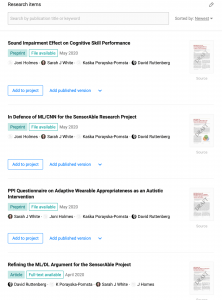Background
Since enrolling as an MPhil/PhD full-time, distance learning, research student at University College London (UCL) way back (?) in June 2019, every day has been in service for this moment…the Mini Viva or Upgrade to full PhD status.
I have been brilliantly guided by my tutors, lecturers, administrators, colleagues, lab-mates, family and of course supervisors along this path and I feel well prepared for the moment at hand. Too, I feel relatively calm and eager to share my progress to date; however, I am more interested in learning and receiving guidance from my illustrious panel with regard to modifications, corrective measures and recommendations going forward.
In many respects, my primary supervisor, Prof Kaśka Porayksa-Pomsta, has all but telegraphed the primary concerns related to my proposed research from the very beginning; that is:
- My metamorphosis from entrepreneur to academic (researcher) is something that must be contended with, as the two camps are both decidedly different and must be respected.
- My desire to develop prototypes in favor of harvesting theoretical and computational underpinnings in support of an assistive technology must be well-tempered.
- The scope of my research is enough to fill multiple doctoral thesis and thus must be narrowed, and then narrowed again (and again, and perhaps again a few more times).

As such, both Kaśka and I fully expect the Upgrade Panel to quickly discover these point, hone in on them, and help me “tease out” those important concepts of my last year in hopes to convey my understanding, appreciation and preparation to complete my thesis within these boundaries and within the ascribed timeframe.
Over-engineering my responses
From the onset of my presentation, which Kaśka later reported was the most concise, comfortable and compelling she has heard me convey, I felt a level of authenticity from my panel. They too indicated that the slides well-attended to my rationale, methods and data collection and that my training, preparation and desire to contribute to academic knowledge was noteworthy.
The panels questions and comments were incredibly thought-provoking, so much so, that I had to ask for clarification on two separate occasions due, not to an error in listening-skills, but to a confusion about how to best address the answers to meet the query.
In one particular example, and largely because I had spent so much time preparing my defense relating to ontological, epistemological and theoretical positioning and frameworks, I almost over-engineered my response when a considerably more simple answer would have sufficed. I fear I may have tripped over my delivery in this section only (!), as I could feel my brain shifting from a considerably higher gear at tremendous RPM, into a considerably more comfortable transmission mode that allowed me to relax into the matter at hand.
I told you so…
And as we neared the apex of the defense, both panel members gently guided me to my state my resolve around the scope of the project. From the onset, I stated my appreciation for shifting from entrepreneurial to academic positioning, toward eschewing a randomized control trial of a prototype to a more theoretical/computational approach and to continually narrow the breadth of modalities to half a handful of study.
And this was the primary lesson…my understanding of the narrowing and how I would go about this was still, perhaps, not direct and concise enough (yet)! In addition to several poignant examples of how my design methods could be further simplified (e.g. considerations of Wizard of Oz methodology were brought to light), the permission for me to select one modality (borne perhaps of my currently concluded data gathering/research/PPI) might enable me to effectuate study of one type of stimuli (e.g. sonic, optic or interoceptive GSR)…but only one!
And with that, I nodded again to my supervisor who was (up until this point) silently taking notes, camera and microphone off, and–no doubt–wagging her finger at the camera knowing all the time that she had “told me so”.
Once I had finished acknowledging that I had been advised of this, Kaśka gently (magically!) appeared on camera with the widest of smile and stated the same. It was actually a very lovely and touching moment…one that I shall not forget…as it placed a cherry atop of the whipped cream of my now fully assembled and soon to be complete upgrade.
The next best thing…
And while I had been longing two carry this process out face-to-face in Bloomsbury, this would not be the case owing to the COVID-19 pandemic. In the end, and despite some of the technical glitches I had heard transpired from other friends and colleagues with their upgrades and presentations, I was grateful to have had this unique, online mini-viva. My panel was generous with their time, effort and genuine interest and I was pleased with the outcome.

That is: I passed!
Funny how in the entrepreneurial world, the words “passed” connote a pejorative meaning. I much rather prefer the academic version and am pleased to be jumping into the deep end now of scholarly work.
As Kaśka mentioned whilst we were awaiting the panel’s decision: “We will make a researcher out of you yet. I am quite proud of you!”
And that was, of course, music to my ears.
